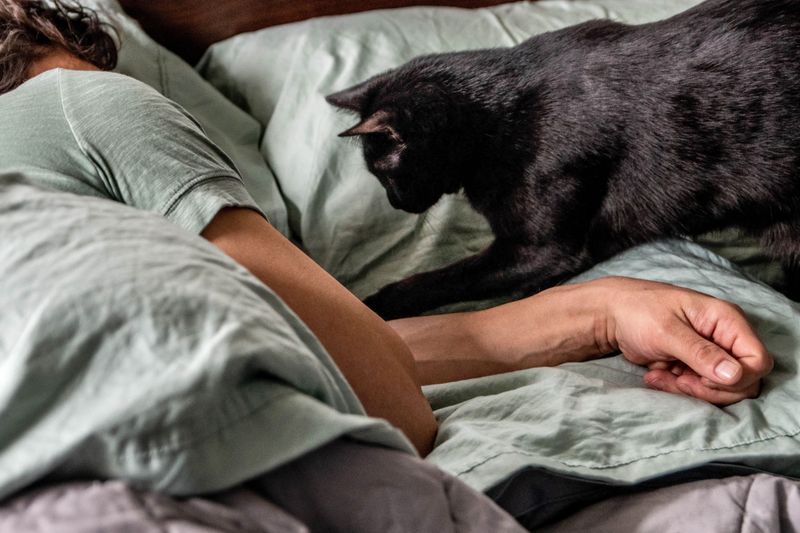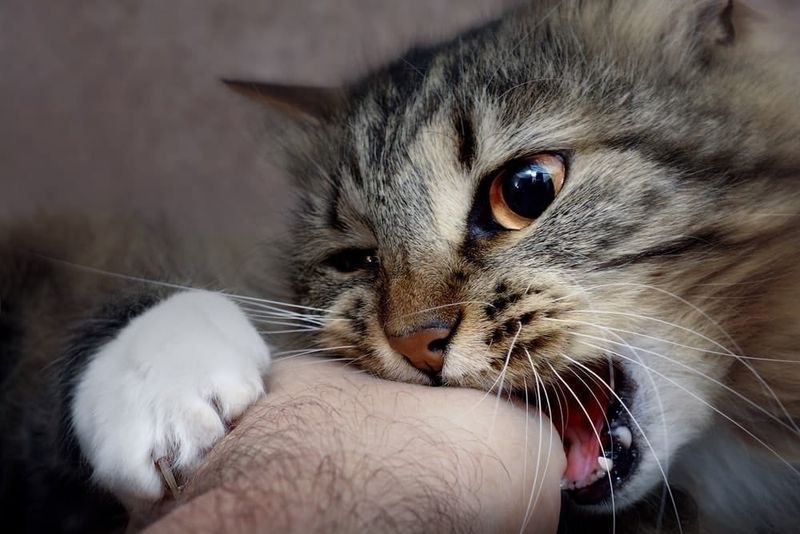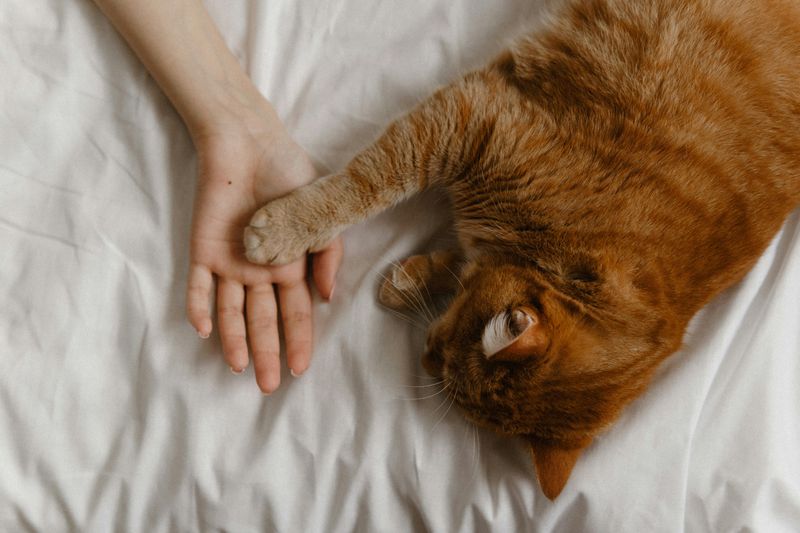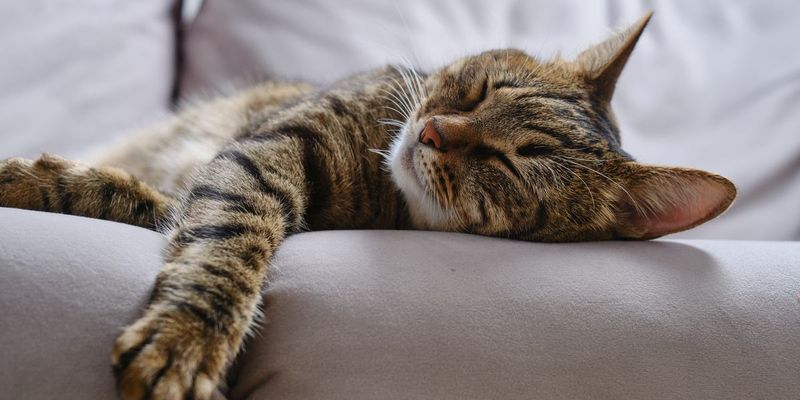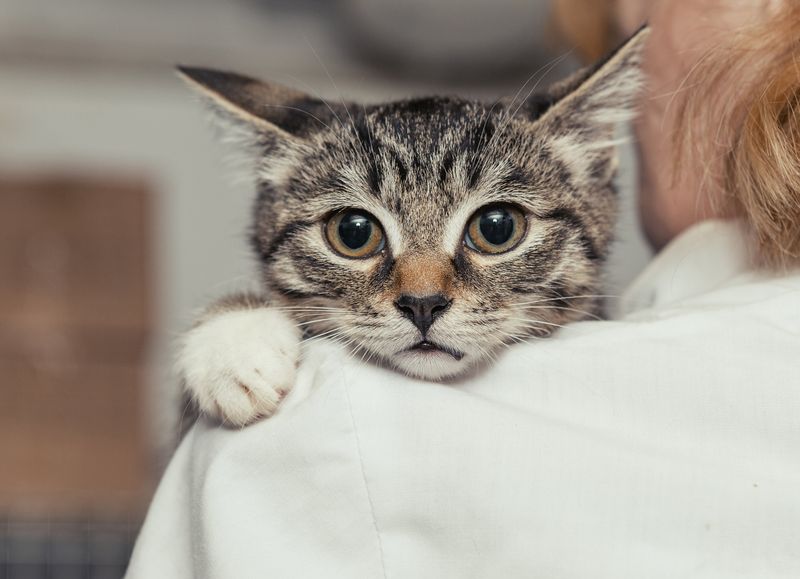📖 Table of Content:
- 1. They Want Your Attention
- 2. Overstimulation or Petting-Induced Aggression
- 3. Territorial or Dominant Behavior
- 4. They’re Startled or Reacting in Fear
- 5. Increase Playtime Before Bed
- 6. Establish a Bedtime Routine
- 7. Use a Separate Sleeping Space (If Needed)
- 8. Ignore Attention-Seeking Behavior at Night
- 9. Reward Calm Nighttime Behavior
Waking up to your cat biting you is not the cozy, peaceful sleep you probably envisioned when you brought home your feline companion. Whether it’s a gentle nibble or a sharp chomp, these unexpected nighttime encounters can be both painful and puzzling. You’re left lying in bed wondering, “Why is my sweet little fluffball suddenly a nighttime menace?”
You’re definitely not alone. Many cat owners experience strange nocturnal behaviors from their pets, with biting being one of the most confusing. While it might feel personal, this behavior is usually rooted in instinct, communication, or unmet needs rather than spite or aggression.
The good news is that there are solutions. Understanding the root causes behind your cat’s nighttime biting can help you make practical changes that lead to quieter nights—for both of you. Let’s break down the most common reasons for this behavior and what you can do to stop it.
1. They Want Your Attention
Midnight might seem like an odd time for attention-seeking, but for your cat, it’s prime time. Biting can be their last-resort method when meowing, pacing, or purring near your face hasn’t worked. Some cats have figured out that biting gets results—whether it’s food, cuddles, or just a sleepy groan from you. You might be unknowingly training them to continue this pattern every time you respond. If the biting leads to you getting up or talking to them, they’ve succeeded. In their mind, that bite was just a push of a button labeled “Human: Activate.” Unfortunately, this button-pressing tends to escalate if left unaddressed.
2. Overstimulation or Petting-Induced Aggression
Not all cats enjoy being touched while they’re resting, especially if it’s unexpected. A sudden pet or accidental roll-over can set off a cat that’s sensitive to physical contact. Even affectionate cats have boundaries, and crossing them in their sleep can spark an instinctual reaction. Their bite isn’t necessarily aggressive—it’s more like a reflexive “stop” signal. Some cats experience overstimulation easily, especially in quiet or dark environments. If they’re already anxious or alert, even small stimuli can provoke a big reaction. That nip might be their only way of saying, “That’s too much!”
3. Territorial or Dominant Behavior
In some cases, your cat might see your bed as their domain—not a shared space. If they’re feeling dominant, they might bite to reinforce their role or claim the area. This can be especially true in multi-cat households where resource guarding becomes an issue. Your movements or mere presence could be perceived as an invasion of their chosen territory. Even neutered or spayed cats can show dominance in subtle ways, including biting. While it may not seem like typical territorial behavior, it’s a communication method. They’re essentially saying, “This is mine.”
4. They’re Startled or Reacting in Fear
Cats are naturally jumpy creatures, and they don’t always recognize what’s going on when startled awake. If you shift positions quickly, snore loudly, or roll too close, it could alarm them. Their immediate reaction may be a defensive bite before they realize it’s you. Fear responses are deeply wired into their survival instincts. This is especially common in rescue cats or those with anxiety issues. In those moments, they’re reacting to a perceived threat—not out of malice. Your sudden movement might have just triggered their fight-or-flight response.
5. Increase Playtime Before Bed
Evening play sessions are one of the most effective tools for curbing nighttime cat chaos. Aim for a 15–20 minute session of high-energy activity that mimics hunting—think feather wands, laser pointers, or toy mice. The idea is to fully exhaust their energy reserves so they’re ready to rest when you are. When your cat is physically and mentally stimulated, they’re less likely to act out overnight. It’s also a great bonding time, strengthening trust and providing a safe outlet for their instincts. Just like kids sleep better after a day of playing outside, cats benefit from routine play. Finish with a small treat or snack to complete the “hunt, catch, eat” cycle.
6. Establish a Bedtime Routine
Consistency is powerful when it comes to managing feline behavior. Creating a nightly ritual helps signal to your cat that the day is winding down. This could involve feeding, playtime, a cuddle session, and dimming the lights in the same order each night. Over time, your cat will learn what to expect and adjust their activity levels accordingly. Cats thrive on predictability and will often mirror your routine if it’s consistent enough. This structure can reduce anxiety and prevent the buildup of nighttime energy. A predictable pattern brings peace to both pet and person.
7. Use a Separate Sleeping Space (If Needed)
Sometimes the best short-term solution is a little physical distance. Giving your cat a cozy, enticing sleeping area of their own—outside your bedroom—can reset the habit. Try placing a heated bed or familiar blanket in a quiet part of the house to encourage them to settle there. It doesn’t need to be permanent, just until biting stops being part of their sleep behavior. If they scratch or meow at your door, resist opening it—doing so reinforces the behavior. Use positive reinforcement in the morning if they behave well overnight. This teaches boundaries without punishment.
8. Ignore Attention-Seeking Behavior at Night
Reacting to nighttime bites can unintentionally reward your cat’s behavior. Even yelling or pushing them away can be seen as interaction—exactly what they were looking for. The best approach is to stay calm and unresponsive, no matter how tempting it is to retaliate. With consistency, your cat will learn that biting gets them nothing. During the day, give them plenty of attention so they don’t feel deprived at night. It’s important not to mix signals—don’t offer affection right after a bite. Patience and consistency will be your best friends here.
9. Reward Calm Nighttime Behavior
Positive reinforcement helps build new habits more effectively than punishment ever could. When your cat gets through the night without biting or bothering you, reward them with treats, play, or affection in the morning. Over time, they’ll associate peaceful nights with positive outcomes. Avoid giving rewards randomly—only offer them when they’ve truly behaved. Cats are quick learners when it comes to linking actions with outcomes. By celebrating the behavior you want, you help eliminate the behavior you don’t. It’s like training, but sneakier.

